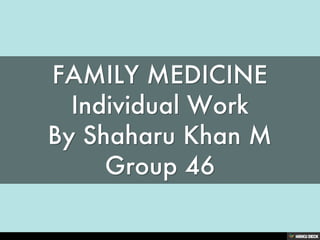Report
Share
Download to read offline

Recommended
Know what is stress, what are the signs and symptoms of stress, also the causes and effects, what are stressors, how we have been reacting to stress, chronic stress and learn how to manage stress. What is Stress? And it's Signs, Causes, Effects and effective Management

What is Stress? And it's Signs, Causes, Effects and effective ManagementThe Midwest Center for Stress and Anxiety
More Related Content
What's hot
Know what is stress, what are the signs and symptoms of stress, also the causes and effects, what are stressors, how we have been reacting to stress, chronic stress and learn how to manage stress. What is Stress? And it's Signs, Causes, Effects and effective Management

What is Stress? And it's Signs, Causes, Effects and effective ManagementThe Midwest Center for Stress and Anxiety
What's hot (20)
What is Stress? And it's Signs, Causes, Effects and effective Management

What is Stress? And it's Signs, Causes, Effects and effective Management
Stress Management (causes of stress n how to manage them) by Sukant GUpta

Stress Management (causes of stress n how to manage them) by Sukant GUpta
Similar to FAMILY MEDICINE Individual Work By Shaharu Khan M Group 46
Similar to FAMILY MEDICINE Individual Work By Shaharu Khan M Group 46 (20)
The Ripple Effect of Stress How it Impacts Your Body, Mind, and Life.pdf

The Ripple Effect of Stress How it Impacts Your Body, Mind, and Life.pdf
American Family-Chapter 8, Managing Stress and Anxiety

American Family-Chapter 8, Managing Stress and Anxiety
Depression why use both psychological treatments and medications

Depression why use both psychological treatments and medications
The Truth About Stress and Anxiety: Why They're Actually the Same Thing

The Truth About Stress and Anxiety: Why They're Actually the Same Thing
FAMILY MEDICINE Individual Work By Shaharu Khan M Group 46
- 1. FAMILY MEDICINE Individual Work By Shaharu Khan M Group 46
- 2. TOPIC Risk factors & prophylaxis of Stress, Hypodynamia & Psychosomatic diseases.
- 3. STRESS Stress is a normal physical response to events that make you feel threatened or upset your balance in some way.
- 4. Risk Factors 1. External Factors 2. Internal Factors
- 5. 1.External Factors • Major life changes • Work or school • Relationship difficulties, children and family • Financial problems • Being too busy
- 6. 2. Internal Factors • Chronic worry • Pessimism or negative self talk • Unrealistic expectations or perfectionism • Rigid thinking, lack of flexibility • All or nothing attitude
- 7. PROPHYLAXIS Managing stress is all about taking charge: taking charge of your thoughts, your emotions, your schedule, your environment, and the way you deal with problems. Stress management involves changing the stressful situation when you can, changing your reaction when you can’t, taking care of yourself, and making time for rest and relaxation.
- 8. Remember the four As: • Avoid unnecessary stress • Alter the situation • Adapt to the stressor • Accept the things you cant change
- 9. You can cope with stress by: • Set aside relaxation time • Exercise regularly • Eat a healthy diet • Get plenty of sleep
- 10. Hypodynamia
- 11. Hypodynamia Slow or diminished movement of body musculature.
- 12. Risk Factors 1. Basal ganglia diseases 2. Mental disorders 3. Prolonged inactivity due to illness 4. Experimental protocols used to evaluate physiologic effects of immobility 5. And other conditions
- 14. A psychosomatic disorder is a disease which involves both mind and body. Some physical diseases are thought to be particularly prone to be made worse by mental factors such as stress and anxiety.
- 15. How can the mind affect physical diseases? It is well known that the mind can cause physical symptoms. For example, when we are afraid or anxious we may develop: A fast heart rate, A thumping heart (palpitations), Feeling sick (nauseated), Shaking (tremor), Sweating, Dry mouth, Chest pain, Headaches,A knot in the stomach, Fast breathing.
- 16. Prophylaxis Each disease has its own treatment options. For physical diseases, physical treatments such as medication or operations are usually the most important. However, healthcare workers will usually try to treat a person as a whole and take into account mental and social factors which may be contributing to a disease. Therefore, treatments to ease stress, anxiety, depression, etc, may help if they are thought to be contributing to your physical disease.
- 17. Thank You By Shaharu Khan Majeed